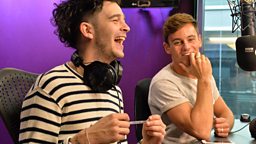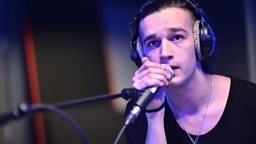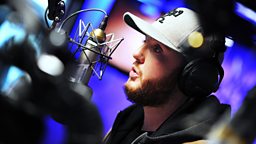8 male stars changing how we think about masculinity

What does 'masculinity' mean in 2016? That's what Gemma Cairney and Dr Radha will be discussing in The Surgery this week on Radio 1 in their special, Being A Man.
Young men face pressures from social media on how to look, dress and act in modern society to fit in, leading to modern issues such as anxiety, body dysmorphia and bigorexia.
But there are inspirational male stars showing young males that there is more to 'masculinity' than lad culture and that real men can share their problems and embrace their sexuality and sensitive sides.
Here's eight hugely important male stars changing how we think about masculinity today.
Olly Alexander
Years & Years are one of the UK's biggest pop bands and since they came to fame in 2015, frontman Olly Alexander has spoken openly about sexuality. He has become one of the UK's most vocal gay celebrities and is a role model and inspiration for countless gay youths across the country and beyond.
One of his most powerful moments came in June 2016, when he addressed homophobia during Years & Years' performance at Glastonbury, on Pride weekend.
"As a queer person, as queer people, we know what it's like to be scared. We know what it's like to live with fear; it's part of our every day," he told crowds at The Other Stage.
"I would like you to ask you to join me on Pride weekend, and say 'no thank you fear'. Just say 'bye, fear bye'"
"What I have to say is ‘I'm here, I'm queer and yes sometimes I'm afraid, but I am never ashamed because I am proud of who I am.’"
Chris Hemsworth
When you think of Chris Hemsworth, you think of Thor, huge muscles and a traditional Aussie bloke. But away from the Hollywood image, Chris is an inspirational family man and loving husband.
His Instagram (along with pics of him dressed a Thor, flexing his biceps and being an Aussie bloke), is packed with photos of his family and home life.
When an Australian magazine published a story about him looking for a new wife, he called them out in public with a photo of him and wife Elsa Pataky, standing up for her in public and assuring fans that their marriage is still strong.
Jaden Smith
Jaden Smith has mixed music, fashion and film during his short career, where he has also experimented with what men's fashion means in the 21st century.
At the start of 2016, Jaden was named as one of the faces of a Louis Vuitton womenswear campaign, where he starred alongside three female models.
Jaden has long refused to dress to traditional gender codes, saying he doesn't see "girl clothes" just "clothes".
He has the full support of dad Will Smith.
"He is completely willing to live and die by his own artistic decisions and he just doesn’t concern himself with what people think," Will Smith told Radio 1xtra's A-Dot in February of this year.
Nick Jonas
Nick Jonas is a heterosexual male but throughout his career, he has spoken openly and often of his support for the LGBTQ+ community. He has shown young people that it is cool to care about people outside your personal demographic. In June of this year, he gave a speech at the Stonewall Inn in New York at a vigil for victims of the Orlando massacre.
"My father, a minister from New Jersey, shaped my view that love is love, that we are all equal," he said.
"That no matter who you are, or where you're from, or where you're going in life, you have the right to love and be loved.
"So yesterday, thinking about the families of the victims and the lives lost, I just thought that could be my friend. That could be my people."
His speech drew criticism from some parts of the LGBTQ+ community who questioned why a straight man was speaking for gay people.
Matty Healy

Drugs remain a huge problem for young people and The 1975's Matty Healy has spoken openly about his experiences with illegal substances.
Matty has brought addictions issues into the spotlight and shown that it is a part of modern life that more young men should be open to discuss.
He told Rolling Stone magazine that his lowest point came in 2014 when his lifestyle threatened his music career.
"I was just doing too many drugs, too hungover all the time, drinking too much, girl stuff, getting more famous, all of this stuff," he says.
He also told The Guardian that he was planning to spend the money he made wisely, for fear of returning addiction problems.
"I'm gonna buy property," he said in 2013.
Zayn Malik
Mental health problems continue to rise for young adults, but most people still struggle to speak about their problems.
Zayn has spoken openly about his mental health issues and has revealed he has suffered from anxiety and eating disorders.
He has cancelled several gigs in 2016 due to anxiety issues, including Capital FM's Summertime Ball.
"I have suffered the worst anxiety of my career," he told fans in a statement.
"I cannot apologise enough but I want to be honest with everyone who has patiently waited to see me."
In a new biography, Zayn also admits to suffered from an eating disorder towards the end of his time with One Direction.
"I’d just go for days – sometimes two or three days straight – without eating anything at all," he writes.
"It got quite serious, although at the time I didn’t recognize it for what it was. I think it was about control. I didn’t feel like I had control over anything else in my life, but food was something I could control, so I did."
Tom Daley

At the 2016 Rio Olympics, Team GB had more gay athletes than any other country.
44 people from the LGBTQ+ community represented the UK and Tom Daley is the most recognisable of all of them.
He came out in a YouTube video in 2013 and shown that sexuality is (of course) no obstacle to achieving sporting success.
James Arthur

James Arthur scored one of the biggest hit singles of 2016 with Say You Won't Let Go, but the former X Factor star has struggled with mental health issues since finding fame.
He has bounced back following accusations of homophobia and despite his success, admits anxiety is still something he deals with every day.
"It's something that's become part of my life," he tells Radio 1 Newsbeat.
"I got really lost and my family could all see it. There was no getting through to me I was just buried in self-loathing and doing all the wrong things.
"I thought I was going to die and the way I dealt with it was by self-medicating and taking more medication than I should have been."
Listen to The Surgery at 9pm on Wednesday on Radio 1




































